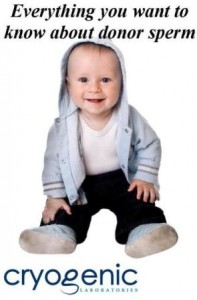What kind of genetic issues are screened for in the donor’s health history?
All donors will have a three-generation family history reviewed by a geneticist. The family history will present information on illnesses and birth defects noted in the individual family members, causes of death, history of miscarriage or reproductive failure, and any known hereditary disorder. Any donor at an increased risk for a genetic or hereditary disorder above that expected in the general population, will be excluded. Examples of disorders that would exclude a donor include alcoholism in a first degree relative, a sibling with spina bifida, a donor with a medical condition such as a heart defect or diabetes, and mental illness or mental retardation in a first degree relative.
Does the normal chromosome analysis on the donor tell me he has no genetic problems?
A chromosome study looks at the whole structure of the chromosome, detecting changes in chromosome structure. It does not look at the level of the genes, which make up the chromosomes like beads on a string. Thousands of genes make up every chromosome. A normal chromosome analysis tells us that no obvious chromosomal defects were found but does not tell us that the genes that make up those chromosomes are indeed normal. Individuals with abnormal chromosome structure (chromosomal rearrangements) are at increased risk for reproductive failure and having children with significant birth defects. They would be excluded from the donor register.
Do you look at the genes of the donor for abnormalities?
Yes, for a limited number of disorders. We do not do a general test that looks at all genes. See the list of genetic diseases tested. Not all genetic diseases known are tested, rather those that are common enough to cause concern, that involve a serious medical condition and that have a readily available genetic test may be selected for testing by our medical director in consultation with our medical advisory board. As gene research progresses, we are constantly evaluating this list of tests on our donors.
If my family history is normal and I am healthy, then what is the chance, if I use a CLI donor, to have a child with a birth defect?
We cannot guarantee that the risk is zero. We know that any healthy couple conceiving a pregnancy has a 3-4% chance of having a child with a birth defect. Family history, good prenatal health, folic acid supplementation prior to and during pregnancy (reducing the risk of neural tube defects), and the age of the mother are all factors that affect the risk for birth defects. Screening tests during pregnancy may be able to offer you important information on the health of your unborn baby. Please discuss any concerns you might have with your physician.



